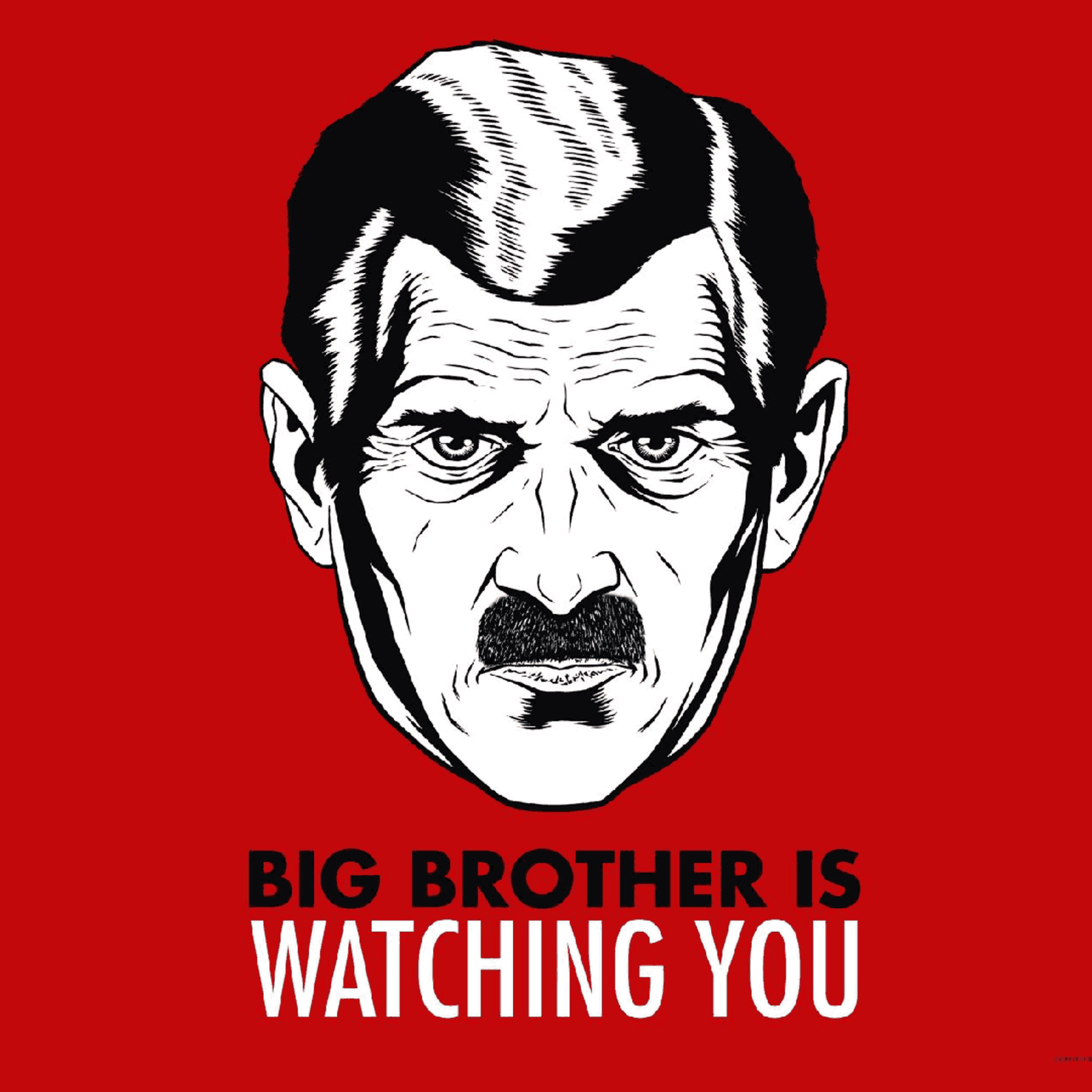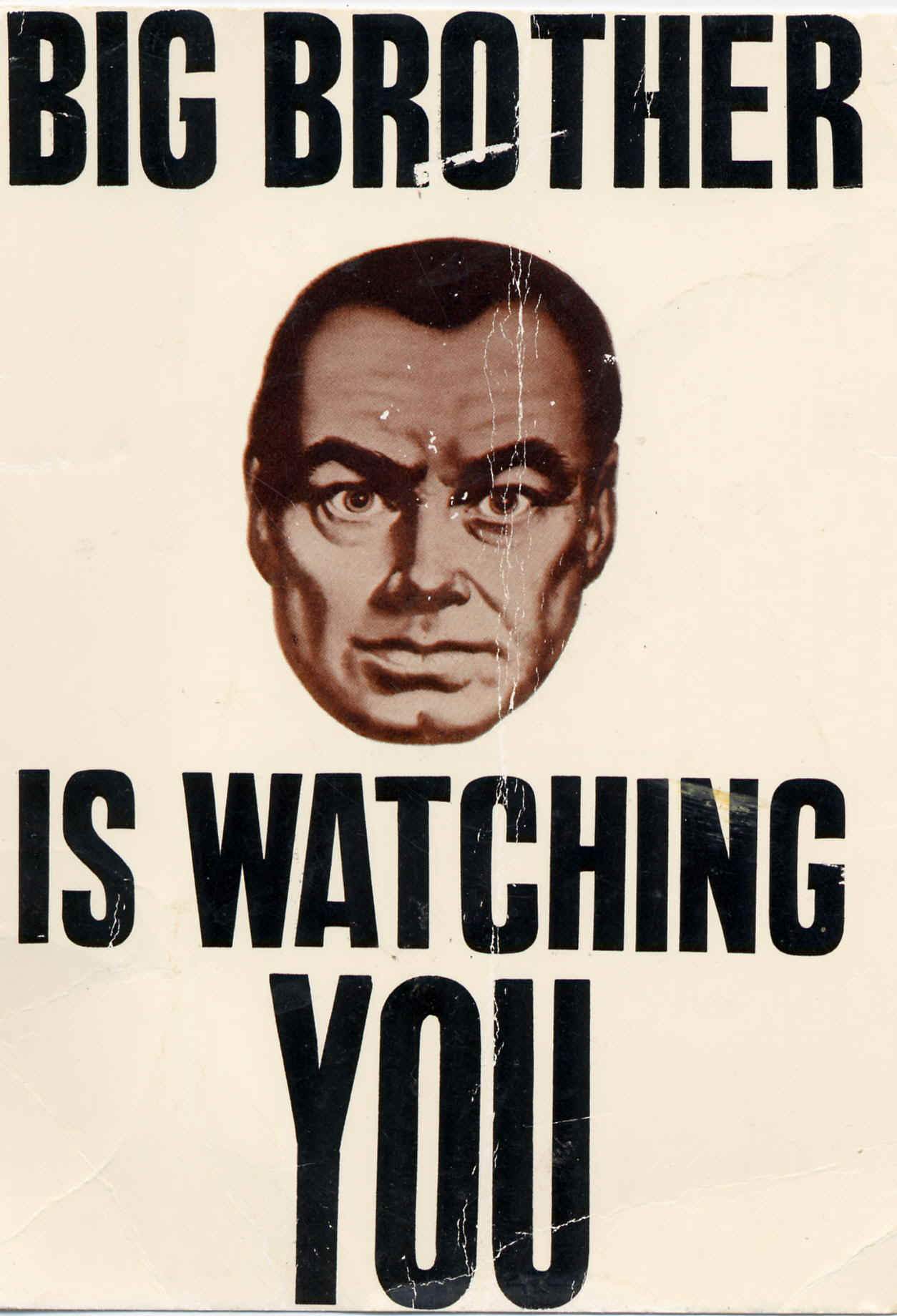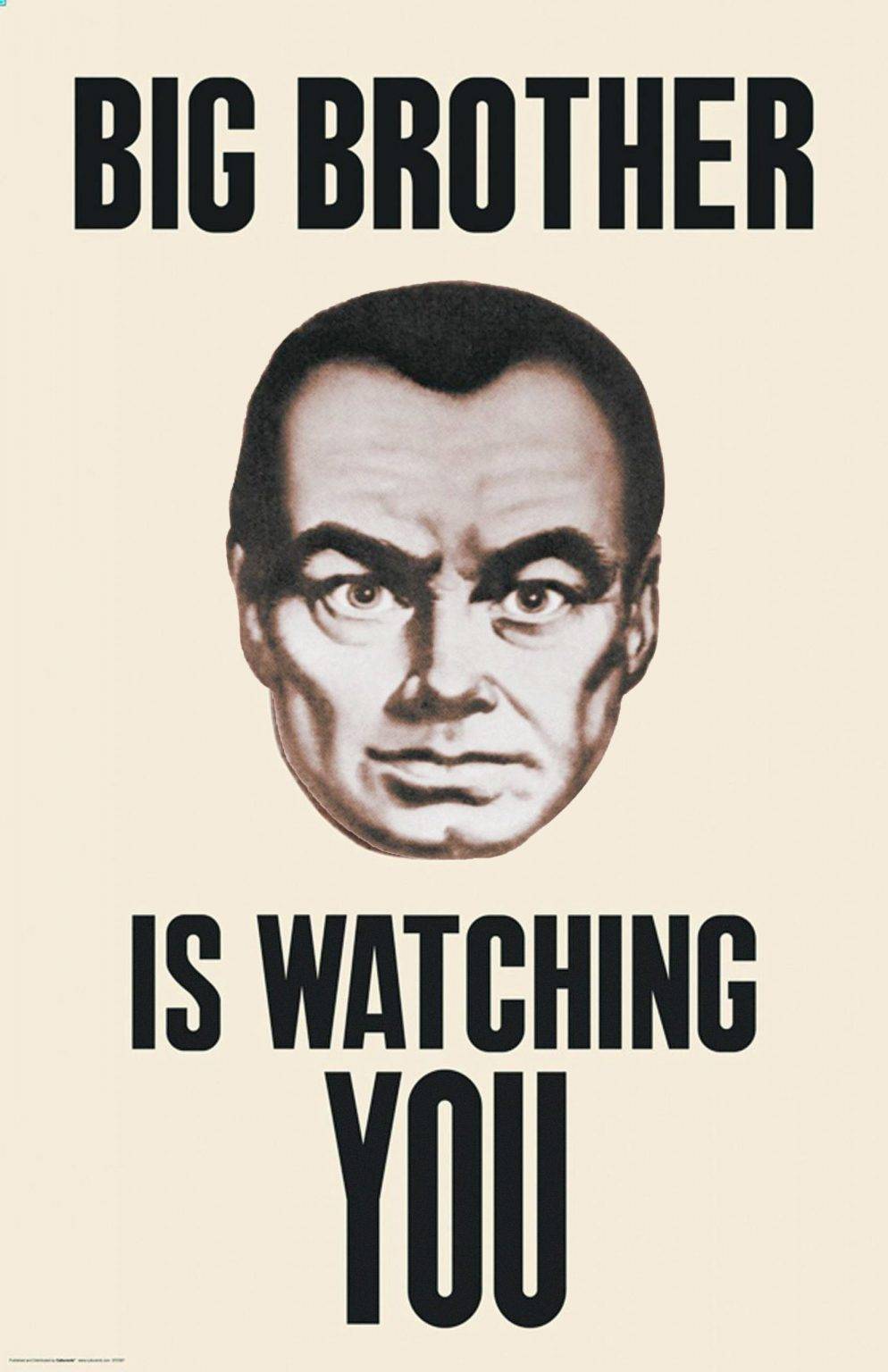Big Brother 1984 - A Look At Orwell's Controlling Figure
Have you ever felt like someone was watching you, every single move, every quiet thought? In a very real sense, that feeling is at the heart of George Orwell's famous book, "1984," where a powerful, ever-present figure known as Big Brother casts a long shadow over everything. This figure, you know, stands as a chilling reminder of what happens when a government holds too much sway over the lives of its people, shaping their actions and even their innermost beliefs. It is almost a warning, perhaps, about how easy it can be for freedom to slip away if we are not paying close attention.
The story takes us into a world where a group called the Party, known as Ingsoc, holds complete power over a place called Oceania. Here, Big Brother is more than just a person; he is a symbol, a face seen everywhere, representing the government's constant watch and firm grip on everyone. This idea of being watched all the time, that there is no private moment, no secret thought, is a central part of the tale. It really shows, in a way, how control can seep into every part of someone's existence, making them feel like they are never truly alone or free.
Thinking about Big Brother from "1984" gives us a chance to look at big ideas like power, observation, and what it means to be an individual in a world that tries to make everyone the same. The book, as a matter of fact, explores how a society can lose its sense of self when a single entity holds all the cards. We will take a closer look at who this Big Brother figure is, what he stands for, and why his presence, even if indirect, shapes the entire world of "1984" and continues to make us think about our own lives.
Table of Contents
- Who is Big Brother 1984?
- What Does Big Brother 1984 Stand For?
- How Does Big Brother 1984 Affect People?
- What About the Supposed Enemy of Big Brother 1984?
- Where Does Big Brother 1984 Appear in the Story?
- Why Should We Think About Big Brother 1984 Today?
- Is Big Brother 1984 a Real Person?
- What is the Relationship with Big Brother 1984 Like?
Who is Big Brother 1984?
Big Brother is a key figure and a powerful sign in George Orwell's well-known book, "1984." He is put forth as the head of Oceania, a place run by a system where the government has total control, known as Ingsoc. This character is presented as the top leader of Oceania, the person in charge of the Party. He is also described as a person who has achieved much in war, a clever inventor, and a deep thinker. He is, essentially, the one who started the big change that brought the Party to power. So, he is a figure of immense importance and history within their world.
He is the one who, you know, is seen as the supreme ruler, a person of great influence and authority. His presence is felt everywhere, even if he is not directly seen by most people. He is the face of the Party, the one who embodies all their ideals and goals. His story includes being a person who has done great things in battles, showing his strength and ability to lead in difficult times. He is also someone who thinks up new things and considers big ideas, making him a figure of both action and thought. Basically, he is the central pillar of this controlling society.
Here are some details about the character known as Big Brother 1984:
| Aspect | Description |
|---|---|
| Role in Oceania | Supreme leader of the state, head of the Party (Ingsoc) |
| Achievements | Accomplished war hero, master inventor, deep thinker |
| Origin | Original instigator of the revolution that brought the Party to power |
| Nature | A character and a powerful symbol from George Orwell's "1984" |
| Presence | Embodies the constant government observation and control |
What Does Big Brother 1984 Stand For?
In the world of "1984," Big Brother represents the complete and total power of the Party, and the way they watch everyone all the time. He stands for control and a heavy hand. His image, seen everywhere, tells people that the Party is always there, always watching, and always in charge. This is what makes him such a powerful sign. He is, you know, the very picture of a government that holds all the strings, making sure no one steps out of line or thinks thoughts that are not approved. It is a system built on keeping everyone in check, every single moment.
He is the living representation of a system that wants to erase individual thinking. The idea of Big Brother means that the Party has total command over what people do, what they say, and even what they believe. This level of oversight makes it so that people feel a constant sense of being observed. It is a sign of how a society can lose its personal freedoms when one group holds all the cards. The figure of Big Brother, essentially, is a warning about what happens when power goes unchecked, and when observation becomes a tool for keeping everyone down.
How Does Big Brother 1984 Affect People?
Big Brother's presence in "1984" has a deep effect on the people of Oceania, shaping their daily lives and their innermost feelings. The constant sense of being watched, the idea that Big Brother is always observing, creates a world where people feel they have no privacy. This ever-present observation means that individuals must be careful about every action and every spoken word. It is a world where, you know, even thinking a wrong thought could have serious consequences, leading to a profound change in how people live and interact with each other.
The system of observation and control, which Big Brother embodies, mirrors a slow wearing away of what makes each person unique. In this society, being an individual is not something that is valued; instead, people are pushed to conform to the Party's way of thinking and behaving. This pressure to fit in, to not stand out, means that personal expression and distinct ideas are slowly crushed. The story shows how this kind of constant pressure can lead to a society where people lose their sense of self, becoming just a part of a bigger machine. It is a chilling look at what happens when personal freedom is taken away, one small piece at a time.
What About the Supposed Enemy of Big Brother 1984?
In the world controlled by Big Brother, there is a figure named Goldstein who is presented as the supposed enemy of the state. He is, in a way, the opposite of Big Brother, serving as a target for the people's anger and fear. The Party uses Goldstein to unite the population against a common foe, even if this foe is largely a creation of the Party itself. This strategy helps to keep people focused on an outside threat, rather than questioning the Party's own actions or the control exerted by Big Brother. It is a clever way, basically, to manage public opinion and ensure loyalty to the ruling power.
Goldstein's role is to be the symbol of rebellion, the personification of everything the Party stands against. By having such a clear enemy, the Party can direct the strong feelings of the people. This figure is used in various ways to reinforce the Party's message and to justify its harsh rules. It is a tool, you know, to maintain the Party's absolute power and to make sure that no real opposition can gather strength. The existence of Goldstein, even if he is never truly seen or understood by the common person, is a vital part of how Big Brother's system of control works.
Where Does Big Brother 1984 Appear in the Story?
Big Brother, as a symbol, shows up throughout the book "1984," even though the character himself does not appear directly in person. His presence is felt everywhere through images, slogans, and the constant reminders of his watchful eye. The story tracks where this powerful symbol appears, showing how it is woven into the fabric of daily life in Oceania. It is almost as if, you know, his face is on every wall, in every public space, reminding people of his unwavering gaze. This indirect but pervasive appearance is what makes him so effective as a tool of control.
The various times Big Brother's symbol shows up are often linked with specific ideas or themes. These connections are indicated by different marks or colors in the book, helping a reader see which parts of the story relate to which larger concepts. For example, a particular appearance might be tied to ideas of absolute power, while another might be about the constant observation of citizens. This way of marking his appearances helps to highlight the different aspects of control and oppression that Big Brother represents. It really helps to show, in some respects, how deeply ingrained his image is in the minds of the people and the structure of their society.
Why Should We Think About Big Brother 1984 Today?
Thinking about Big Brother from George Orwell's "1984" is still important for us today. The book's ideas about observation and control, and how they can slowly take away a person's unique qualities in a society where the government has total power, are still very much worth considering. The story, you know, gives us a chance to look at these concepts in a way that makes us think about our own lives and the world around us. It is a story that prompts us to ask questions about who holds power and how that power is used.
The ideas presented in "1984" offer clear answers to why we should care about Big Brother. They are given in a way that is quick and easy to grasp, making the core messages accessible. The book explores the feeling of constant observation and how that can affect what people think and do. It is a powerful reminder of how important it is to protect individual thought and personal freedom. So, in some respects, the lessons from Big Brother's world are still very much alive and relevant to discussions about privacy, government reach, and the importance of being able to think for oneself.
Is Big Brother 1984 a Real Person?
Big Brother is a figure from George Orwell's book "1984," and he is not a real person in the way that you or I are. He is presented as the leader of Oceania, but his actual existence as a living, breathing individual is left unclear. The book suggests that he might be more of a symbol, a face created by the Party to represent its absolute power and constant observation. This means, you know, that his power comes not from his personal presence, but from the idea of him, the image of him that is seen everywhere.
Even though Big Brother is described as a war hero, an inventor, and a thinker, he never shows up directly in the story. This absence makes his power even more chilling, because it means he is everywhere and nowhere at the same time. He is a concept, a tool used by the Party to control its people. The question of whether he is a real person or just a made-up figure is part of the book's mystery and its commentary on how governments can use symbols to maintain their grip. He is, basically, the ultimate embodiment of a distant, all-seeing authority.
What is the Relationship with Big Brother 1984 Like?
The main character in "1984," Winston Smith, has a very complex and changing relationship with the figure of Big Brother. At times, Winston feels a deep, hidden dislike for Big Brother, a quiet anger at the constant control and the lack of freedom. This feeling of hatred is a secret he holds close, as expressing it would be extremely dangerous in Oceania. It is, you know, a battle fought entirely within his own mind, a quiet rebellion against the system that surrounds him.
However, there are also moments when Winston's secret dislike for Big Brother shifts into something like great admiration. In these instances, Big Brother seems to grow in Winston's mind, becoming a figure of great strength and protection. He appears as someone who cannot be defeated, a fearless guardian standing firm like a strong rock against countless dangers. These shifts in feeling show the deep psychological effect that Big Brother's image has on the people of Oceania, even on those who secretly resent him. It is a powerful illustration of how a controlling system can manipulate emotions, making people feel both fear and a strange kind of devotion towards the very power that oppresses them.

Big Brother – 1984 - GuiadoCFTV

1984 George Orwell Big Brother

Big Brother Is Watching You – George Orwell – 1984 – Propaganda